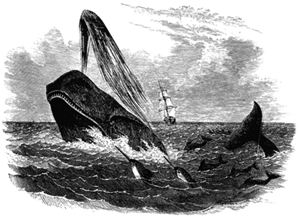
Moby-Dick; Or, The Whale




1851, Herman Melville
I’d recommend this book to:
 Anyone who likes a tough but rewarding classic
Anyone who likes a tough but rewarding classic- Enjoyers of Shakespeare
- Very patient people
- Those at or over fifteen years of age
- Americans and those interested in American literature
- Those with a good grasp of world history
This is my absolute favorite book. Perhaps it’s strange, then, that I gave this book only four stars. In truth, it’s one of those books that really takes you for a ride. Some parts of them you’ll take to heart for the rest of your life, other parts are so, so dry you may want to ditch the book for weeks on end.
Contents
One of the really nice things about Moby-Dick is that it has so many themes that everyone takes something slightly different away from it—it’s like a brilliant diamond with each facet being a beautiful new interpretation, the diamond the entire book. I’ve heard it be interpreted as a contrast between science and the spiritual, the known and the unknown, life and death, God and the Devil, land and sea, safety and danger; between the rebellious American spirit and authority, between religion and the ultimately ungraspable magic of the world. There are still more—some say it’s an attack on transcendentalism, others a satire on Romantic values. I haven’t grasped all of them, and I think that’s how the book is designed to be.
It seems very much a Romantic book, but much more mysterious and otherworldly than usual—it seems Melville has one foot in this world, one in the other. The book starts out (relatively) normally on land, but as it goes on, it’s like descending deeper into an ocean’s depths and seeing the host of beautiful but unearthly inhabitants of the abyss. Between Melville’s ramblings, people start going crazy. The author suggests that’s a good thing. People die and resurrect. Prophecies are formed, characters monologue about God in raging typhoons. Melville isn’t always head-in-the-clouds and idealistic, however, as many Romantic writers can be—he comes down to Earth with his witty, wry remarks, often critical of the lily-liveredness and closed-mindedness of people in his age.
His writing style draws inspiration from the Bible and Shakespeare, making it sound archaic and dramatic, but not stilted enough to stop it from being hilarious and ironic at times. His figurative language is very creative, for example:
So, what’s not to like about this book?
I’d say that about one-half of the book consists of ramblings about whaling—everything to do with whaling. What kinds of ropes sailors use, the various parts of a ship, the various parts of a whale, the history of whaling, whaling companies. Whaling is a long-dead industry which can feel pointless to read about.
Furthermore, there are a profusion of historical references in this book. Remember what I said about “never fully understanding this book”? Do take it on a literal level as well, for there are such references on perhaps every other page. Melville constantly uses phrases such as “dead as ancient Medes”, “Spanishly conquered”, or “Pythagorean maxim”. Depending on your knowledge and interest in history, this may or may not be a good thing. At its very worst, it can result in having to read over four-hundred pages of a nineteenth-century man rambling about obselete topics while dropping abstruse historical references. Although Moby-Dick is very well-known, a lot of people actually end up hating it because of this. But while those sections were difficult for me, too, I still think the real reason people don’t like the book is because they don’t understand it enough—the good parts of the book redeem it, and I’ve yet to read anything quite like it.
Other stuff
My favorite chapter was The Symphony (132). I found its themes striking, about lost youth especially. It’s troublesome to think that people sometimes grow up to do things they hate or regret, but are trapped into doing it for the rest of their lives.
Those who have already read the book may find Hubert Dreyfus’ lecture interesting.
Page created March 7, 2024.